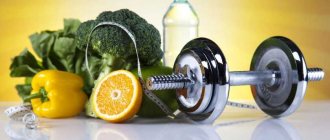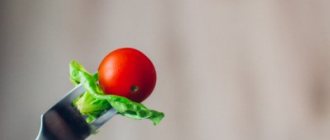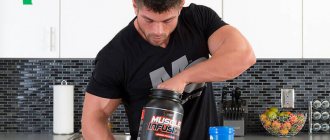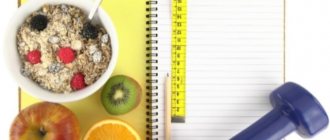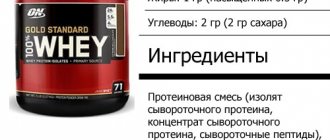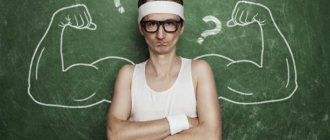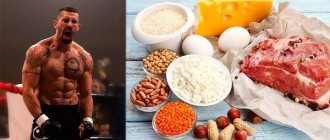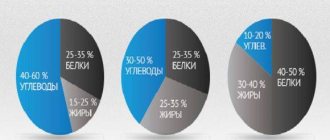Post-workout nutrition to gain muscle mass: basic rules
The main mistake of most novice athletes is the lack of a balanced diet to maintain the balance of nutrients in the body.
There is no point in heavy physical activity if there are no foods rich in protein, carbohydrates and fats in the diet.
Rules for steadily building mass and strengthening tendons:
- You should eat at least 6 times a day (instead of three). The break between doses can be up to 3 hours.
- The diet should be designed in such a way that the calorie content of food per day exceeds the body's expenses. The body will use excess calories to build muscle tissue.
- Fats are necessary, but in limited quantities. It is advisable to exclude products based on fast carbohydrates from the diet.
- Switching to a purely protein diet will only harm the body. The ideal menu contains proteins, fats and carbohydrates. The share of high-protein foods should be at least 60% of the total calorie content.
- Daily fluid intake is at least 2.5 liters. Water obtained from food is also taken into account, but its amount is insignificant.
- The main amount of food should be eaten before 6 pm. Next, light snacks are acceptable. The calorie content and weight of each meal should be approximately the same.
Be sure to read: Protein for girls to gain muscle mass: which one is better, how to choose, how to drink
A little protein before bed

Rethink the popular rule about not eating before bed. It is possible - but only if you know what exactly. A serving of whey protein or a plant-based protein shake around 10:30 p.m. will help maintain muscle mass and stimulate protein synthesis at night.
A low-calorie, but highly nutritious “mini-dinner” will increase muscle growth by almost 25% and provide a pleasant feeling of satiety. But do not try to replace pure protein with carbohydrates - they will instantly turn into fat.
How long after training should you eat?
During exercise, the body consumes useful substances; to restore old tissues and create new ones, an increased amount of useful substances is required.
The main condition for the effectiveness of post-workout nutrition is to be in time for the “anabolic” window. Within about 20 minutes after the end of strength training, the body is ready to absorb nutrients at double the speed and benefit.
It is best to eat curd products, eggs, beans, and not fatty foods, since all the fat received will be used by the body to build a fat layer.
You can use protein powder to make a protein shake. A source of sufficient carbohydrates is bread or pasta.
Fat cannot be completely excluded from the menu, but its content should not exceed 3 g.
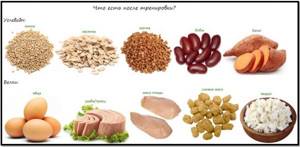
All types of fried foods should be excluded from the post-workout diet; yoghurts and dairy drinks should contain a minimum amount of fat. Of the meat products, chicken breasts are the most valuable due to their minimal fat and carbohydrate content.
Beef and pork should be excluded from this meal due to their high fat content.
Although the athlete feels pain and fatigue, after training the body is in the excitation phase for at least another 1 hour. At this time, products containing tonic additives (energy drinks, coffee and tea) are prohibited for consumption.
Carbohydrate window after exercise
In bodybuilding there is a concept - the post-workout carbohydrate window. This is a short period of time, from 15 to 40 minutes immediately after training. At this time, our body needs nutrients. During this period, our body is able to absorb a significant amount of nutrients. Primarily proteins and carbohydrates. Proteins are a building material for muscles, carbohydrates are a source of energy to replenish the energy spent during training and build new muscle fibers. Method of consumption immediately after training of protein or gainer (liquid shake with a high content of carbohydrates and proteins). Opinion leaders such as Denis Borisov, author of the Fit for Life blog, believe that the importance of this anabolic window is exaggerated.
He says that guys who stopped consuming liquid sources of carbohydrates after exercise, replacing them with regular food. And then they completely shifted their food intake by an hour or two, and did not notice any deterioration in weight gain. And we even noticed an increase in strength and muscle mass.
The author of the blog himself refused to consume food during the carbohydrate-protein window and drank only water immediately after training. And then at home I ate rice with meat and vegetables an hour to an hour and a half after the end of the workout. This method, according to his observation, did not have a negative effect in terms of restoring glycogen in the muscles. This method of eating simplifies digestion because blood flows from the muscles to the stomach.
What to eat after training for muscle growth
Your post-workout meal should include a protein shake or egg whites. This is a great way to quickly deliver protein to hungry muscles.
The main thing is to avoid fatty foods. If you want meat after class, then it is better to choose chicken breast rather than drumsticks or wings. Chicken skin is excluded from the diet for any type of preparation (boiled, fried). It is undesirable to consume meat by-products (pork/beef ears, chicken hearts, etc.).
Be sure to read: Which is better and how to take brewer's yeast for weight gain, what is useful for women and men
Carbohydrates as a source of energy after exercise
Glycogen is a key substance necessary for muscle function. During training, its reserves are spent, and after it it is necessary to quickly restore them. The best way is to consume fast carbohydrates immediately after exercise (in the locker room).
The rate of absorption of a product is determined by its glycemic index.
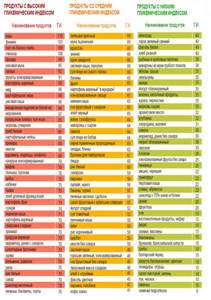
Of course, chocolate bars and cakes look tempting, but eating them causes a sharp increase in blood sugar levels, which is harmful to health. But boiled potatoes, muesli and white bread toast are perfect.
Proteins for muscle fiber recovery
Protein is the basis for building muscles.
To speed up recovery, the diet includes the following foods:
- fish (tuna, cod);
- chicken meat (breast part), lamb (thigh), beef and pork pulp;
- Dairy products include cheeses and cottage cheese (low-fat);
- boiled eggs (whites only, no yolk needed);
- beans and nuts.
The rest of the products either do not have enough protein or contain a lot of fat.
What to eat before and after training to gain muscle mass
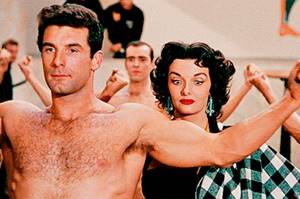
It is impossible to become stronger without pumping up your muscles. Experts advise relying on strength training with progressive load (gradually increasing weight). However, what you eat before and after going to the gym is also important. SPLETNIK.RU tells you which products will help speed up muscle growth. Many fitness experts believe that the few hours after a workout are a crucial time to “refuel” the body, because this is when our muscles are actively recovering, becoming larger and stronger. During sports, glucose is consumed first, then glycogen (so-called storage carbohydrates), and only after that adipose tissue. Therefore, after training, the main thing is to restore blood glucose levels.
Protein bars, natural yogurt, chicken breast, cocktails - there are many options for getting the required portion of protein (it is this that acts as a building material for muscles).

According to nutritionist Michelle Fumagalli, RD, to build muscle, you need carbohydrates as well as protein. Carbohydrates do the job of replenishing glycogen, the glucose your body uses to generate energy wasted during exercise. If you're focusing on strength training, you'll need a little more protein; If you've just finished doing cardio (such as running, swimming or cycling), then carbohydrates should be your priority. One thing is for sure - these two types of training need to be alternated if you want to gain muscle mass,
- says Michelle.
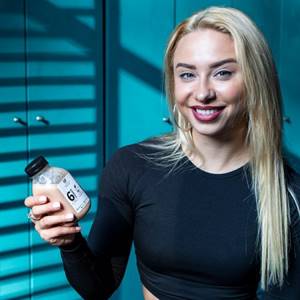
Ambassador of the healthy food delivery service Grow Food, vice-champion of Russia and Europe in athletics, Maria Sokolova
It is very important to understand that gaining muscle mass is not the same as gaining excess weight by eating muffins and ice cream. After all, in this situation, you, of course, will easily gain 10 kilograms, but 8 of them will be hated fat. That is why gaining weight is a very serious process and must be approached correctly.
One of the most important building blocks for our muscles is protein. Those who are actively gaining weight need to eat at least two grams of protein per kilogram of your weight, that is, if you weigh 60 kilograms, you should consume about 120 grams of protein food daily,
Also, when gaining muscle mass, the expert advises paying attention to the “right carbohydrates” - grains, cereals and vegetables. They should be consumed two to three grams per kilogram of weight. It is very important to eat carbohydrate foods either before training or immediately after.
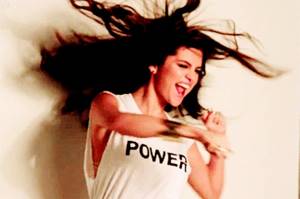
So what is the best thing to eat after a workout and when?
A complete, balanced dish. Eating healthy foods will replenish your protein, carbohydrates, fiber and vitamins. If a piece doesn’t fit into your throat, you can divide the plate into quarters. One portion is a carbohydrate source (like brown rice), one portion is a lean protein source (salmon, chicken, pork tenderloin, or steak), and the rest—about half the plate—is vegetables.
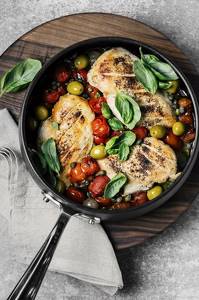
Toast with two eggs, half a cup of oats with berries, Greek yogurt with granola and berries, and sweet potatoes are all good post-workout foods, Michelle explains.
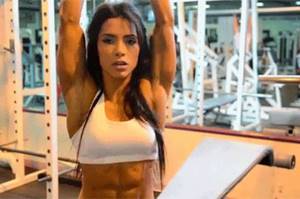
No time to cook? Protein shakes (it's better to add apples or bananas to them) or bars are also suitable as a snack. Some nutritionists believe that the body is ready to respond to protein two hours after exercise. But according to a study published in 2013 by the Journal of the International Society of Sports Nutrition, muscles are most receptive to protein four to six hours after physical activity.
Protein synthesis slows by about 15 to 30 percent during sleep, so if you exercise before breakfast, you'll want to eat as quickly as possible, experts say.

Pre-workout food also matters: two to three hours before exercise, you should eat a serving of protein. Research from the University of Texas has confirmed that the most effective option for building muscle is to eat 30 grams of it (per meal) throughout the day.
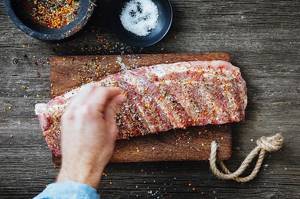
Best Sources of Protein
Leucine is by far the most important of the 20 amino acids for building muscle. Two to three grams of leucine are required from a meal to achieve maximum anabolic effects.
Almost any palm-sized portion of meat or poultry will contain at least two grams of leucine. If cholesterol is high, it is better to give preference to the breast rather than other parts of the chicken. A recent study found that 100 grams of chicken breast contains 53 milligrams of cholesterol, and 100 grams of chicken thigh contains 82.9 milligrams.
About 20 grams of highly digestible protein are found in the meat of trout, salmon, cod, tuna, chum salmon, pink salmon, mackerel and mackerel.
Three eggs, two glasses of milk, a piece of fish or a glass of kefir will give you about 1.5 grams. A small plate of cottage cheese or a couple of pieces of cheese (25 grams each) will give you about 3 grams. Among plant foods, soy contains the most leucine. A cup of soybeans is approximately 2.3 grams. In beans and lentils - from 1.2 to 1.4 grams.
According to The Nutritional Value and Health Benefits of Chickpeas and Hummus, four tablespoons of chickpea hummus provides 14 grams of plant-based protein, 25 grams of fiber and a variety of vitamins and minerals.

Last but not least, don't forget about hydration. As with anything, it is very important to remember to drink enough fluids. Start each day with a glass of drinking water and, in general, try to drink plain water throughout the day, recommends Maria Sokolova.
You can also drink sports drinks with electrolytes. They will help you recover after a hard workout - we lose electrolytes when we sweat. These particles help the body retain water, control the acidity of our blood and regulate muscle function and cellular nutrient metabolism.
What foods to avoid?
The right diet is the key to success in building the body of your dreams.
The list of prohibited foods for all athletes is as follows:
- products of the sausage industry (sausages, slices);
- chips, crackers, semi-finished products;
- products of non-natural origin (black ice cream, watermelon-flavored water, etc.).
These foods should be excluded from the diet. If they are your constant companions, start gradually giving them up. This will slow down your training progress, but will make it easier to give up bad habits.
Post-workout food for muscle growth: 10 foods
Basic products for balanced nutrition of the body:
- still drinking water;
- egg white (yolk is discarded);
- fatty fish (in moderation) to saturate the body with Omega-6 and Omega-3;
- buckwheat (contains a large amount of amino acids);
- almonds (to replenish vitamin E reserves);
- dairy products before bed (cottage cheese, yogurt and milk);
- flaxseed or olive oil;
- green beans;
- protein supplements as a source of pure protein;
- fruits and vegetables to supply the body with all groups of vitamins.
Be sure to read: What to eat before training: top best foods for gaining weight
